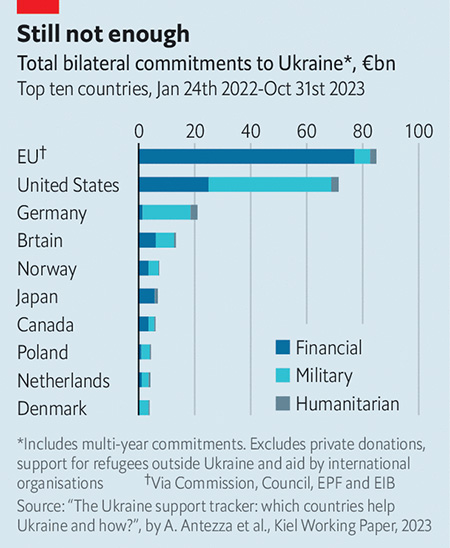
Russia’s economy is nearly 14 times the size of Ukraine’s, but the combined resources of Ukraine’s allies are so much greater that it should be able to win. Yet as the conflict enters its third year, it is Russia’s defence industry that is slowly turning the war in its favour, admits ‘The Economist’.
Nothing shows the problem more starkly than artillery shells. At the height of Ukraine’s summer counter-offensive, it was using some 7,000 a day, significantly more than the Russians. This has reversed: since last month, while Ukrainian forces have been rationed to 2,000 shells a day, the Russians have been firing five times that number. Talk of a stalemate is complacent…
Both America and the European Union are having trouble delivering aid. In Washington, $61bn-worth of military assistance is held up in Congress by a row over immigration. In Brussels, €50bn ($54bn) of financial support is stymied by the veto of Hungary’s pro-Russian leader, Viktor Orban. The Europeans are optimistic that aid will be released at a summit in February. But Ukraine worries that American hyper-partisanship and Donald Trump’s hostility will steadily throttle support from the Pentagon. That may leave Ukraine wholly dependent on Europe.
The committed military aid of EU countries has surpassed America’s €44bn. Germany has given more than €17bn; the Nordic countries are digging deep too. But the picture is patchy. France has contributed a meagre €0.5bn. Last March the EU said it would buy Ukraine 1m artillery shells over the course of a year, via the European Defence Agency. By last month it had supplied just 480,000, though the EU still insists the total will be met.
This month nato’s Support and Procurement Agency said it would help a group of eu members to bulk-buy 1,000 Patriot air-defence missiles worth about €5bn. nato is not allowed to send lethal aid directly to Ukraine, but the order will free up member countries to transfer their own air-defence assets. The eu’s Act in Support of Ammunition Production (asap) programme, launched in October, will allocate €500m to ramping up shell-making. But it will take time to have any impact…
The most forward-leaning European producer has been Rheinmetall. It has committed to annual production of 700,000 artillery rounds by the end of 2024, and will this year open production and maintenance facilities in Ukraine for armoured vehicles. Most of its orders are paid for by Germany. Mr Tusa contrasts this to France, whose orders have not matched President Macron’s rhetoric about shifting to a war economy.
Nico Lange, a former adviser to the German defence ministry, says that for Europe’s biggest missile-maker, mbda, to set up new factories, governments must buy at least ten years’ worth of production. If investments were made now, he reckons the rockets might start arriving in 2026.
Europe will struggle to keep Ukraine in the fight this year if American assistance dries up.
They say Europe is not involved in war with Russia. But judging by this frank report on military deliveries it is. The main question is – do Europeans want to be part of it? This type brinkmanship may one day break.
read more in our Telegram-channel https://t.me/The_International_Affairs

 12:08 17.01.2024 •
12:08 17.01.2024 •






















